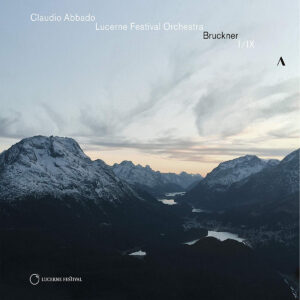A new recording of Claudio Abbado conducting Bruckner symphonies at the Lucerne Festival? Of Symphonies 1 and 9, no less, bookending Bruckner’s output—a beginning and an end, entry and exit, and wonderfully symbolic? Not so fast. Both performances had their previous outings. The First on Accent and the Ninth on an Accent DVD, and as a CD on DG (both singly and in the Abbado-Bruckner box), when the Yellow Label licensed this live recording of Abbado’s very last concert and issued the Bruckner-bit on CD.
It is tempting to interpret this Bruckner Ninth as a double-farewell since it was Abbado’s last public appearance as a conductor. (It also featured Schubert’s “Unfinished” Eighth—for yet more retro-fitted symbolism!) Actually, it is just one of the calmer, steadier, and better played Ninths on disc—uplifting, not maudlin. Tip-toe pizzicato and vigor in the second movement show off the orchestra; the finale rises with uncommon silkiness and warmth.
Although there was some decent Bruckner among Abbado’s output (his 1969 and 1996 Vienna Firsts, his 1990 Vienna Fourth), he really only developed a knack for Bruckner, as many conductors do, in his autumn years. Or did he? Because this really is not “Abbado’s Bruckner” as much as it is every participating musician’s Bruckner “for Abbado”. On the plus side, it’s played much better and in front of a much better-behaved audience than Abbado’s Vienna account of the Ninth. But it’s more impressive in its details than in the elusive, clichéd-but-true Brucknerian long line. It’s a showcase of what an orchestra can do. But for a truly great, coherent Ninth, classics like Giulini (Vienna/DG or Chicago/EMI/Warner) or Wand (NDRSO live, RCA/Sony) are to be preferred.
The edition of the First, in this case, is the revised 1891 “Vienna” version, whereas Abbado’s rather fine Vienna recording of the symphony was of the revised 1877 Linz version. Not that any of that matters nearly as much as the quality of the performance. Critics at that last concert gushed: “Abbado uncovered the radical nature of [this symphony]”. That sounds unlikely. Was Abbado really so much the man for musical insights and un-coverings, rather than simply top-notch execution? If there’s any surprise about him conducting this symphony, it isn’t what Abbado did, but that he played it at all or that he recorded it thrice! In any case, he and the Lucerne Festival Orchestra give the work the loving and grand treatment that helps propel this easily overlooked gem to our deserved attention.
And now that it has your attention, you might also turn it toward Sawallisch (Linz/Haas, Orfeo), Jochum (Linz/Nowak, DG), Tintner (Linz unrevised, Naxos), or Chailly (Vienna, Decca) who all excel at the First. That said, and despite the sound being rather more muffled than I remember on last hearing these releases, it would be unfair to dismiss this two-fer entirely. It contains the best of Abbado’s Bruckner in one well-made set replete with a large booklet full of gorgeous pictures and a trilingually gushing essay.
































